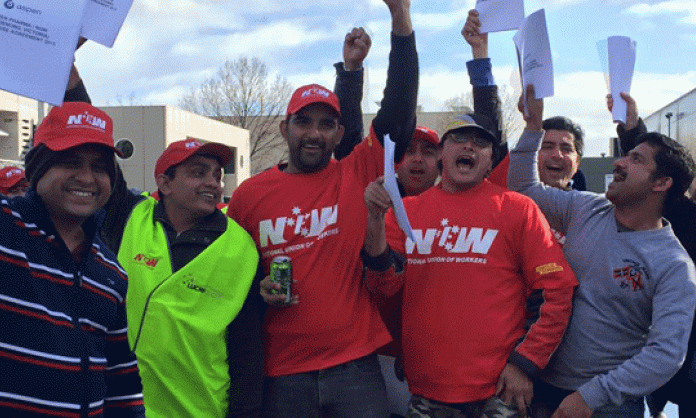Workers have claimed victory after ending a 10-day strike at their factory in Dandenong, a suburb in Melbourne’s south-east. Members of the National Union of Workers and Australian Manufacturing Workers’ Union voted up a new four-year agreement with Aspen Pharmacare on 17 July. The deal protects a raft of conditions, including a 36-hour week with rostered days off (RDOs).
“We just want respect”, insisted Ramon (not his real name), a process worker. He was the first person to grab my hand excitedly as I walked up to the picket a few hours after the vote. Others are gathered in circles still celebrating their win.
Ramon had been on the picket line throughout the strike. He says that they won a higher pay rise than they had initially demanded (12.5 percent over four years), as well as back pay for the duration of the dispute. However, he says that maintaining the current RDO structure was the backbone of their resolve.
“We didn’t want to lose what we’ve already got; we’d never get it back again”, he said. “It was fought for 20, 30 years ago. People like my dad fought for these conditions and I didn’t want to lose them.”
As we talked, a handful of workers surrounded us, all wanting to have their say. I asked about their experience on the picket line. “The company always talks about ‘team bonding’”, says one. “But they ought to let everyone come out on a strike for a day – that’s real bonding!”
“They reckon it was the coldest week in seven or eight years in Victoria”, says another. “We were out here the whole time and no one complained. There was not an angry word spoken, everyone just got along.”
Prior to the strike, the unions and management had been at a deadlock in enterprise agreement negotiations. Management wanted to extend the working week and halve the number of RDOs for all new hires, from 24 to 12 a year.
When workers responded with a 24 hour stop-work on 8 July, the company locked them out the next day. Both unions – with a combined membership of around 175 – voted to stay out indefinitely.
NUW organiser Andy Riley said that the workers were happy to get the pay rise but, most importantly, didn’t want to lose any conditions.
“A lot of people here haven’t experienced a picket line before. Many of them knew we had good conditions, but they didn’t know how they were achieved. But they know that now. That’s what unionism is all about.”
According to Andy, the strike helped break down barriers between workers in different departments, unions and with varied cultural backgrounds.
“‘The workers united will never be defeated’ is the old adage. That was the case here”, he said. “There are a number of cultural backgrounds [among workers] in here, and normally they all eat in their little groups. But I don’t think they’ll eat in their groups any more.”
The joint participation of AMWU and NUW members was important to the outcome. The NUW covers the process workers, while the AMWU covers the maintenance staff who look after the factory machinery. They have separate agreements.
John (not his real name) is a delegate with the AMWU. He says that, in the past, overtime wasn’t delegated fairly and that many casuals had worked there for two years or more and not been offered a permanent job.
“Now, everyone who’s been on for two years will be offered a full time job, as will anyone who works here for four months.”
Explaining the importance of joint action, he said, “We’ve [AMWU members] been at it for 18 months”.
“They’ve locked us out a couple of times, and we’ve had stoppages, but we just didn’t have the strength. When the two unions combined, it made a huge difference.
“We had separate issues, but we made sure all the issues were sorted out before anyone went back. The two unions came together and everyone was motivated and coming forward. It was amazing, it really was.”










